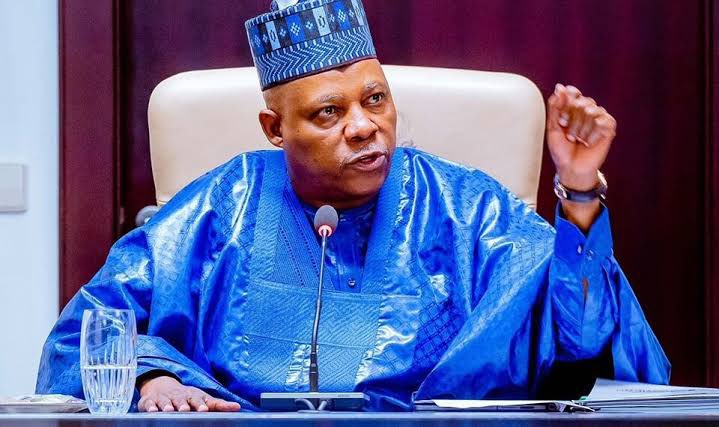Nigerian Government restates commitment to protect Farmers
Timothy Choji, Abuja
Nigeria’s Vice President, Kashim Shettima has restated the current administration’s commitment to building the capacity of smallholder farmers in order to address the food shortage.
Vice President Kashim Shettima disclosed this on Tuesday during a two-day high-level strategic meeting on climate change, food systems and resource mobilization held at the Banquet Hall of the Presidential Villa, Abuja.
He said: “The Nigerian Government, being aware of the invaluable contributions of smallholder farmers in land restoration initiatives, is irrevocably committed to building the capacities of small-scale farmers through various intervention programs to enhance their productivity while also serving as a vehicle for restoring degraded land.
“Each of us here must be aware that food security has been one of the eight areas of priority declared by His Excellency President Bola Ahmed Tinubu. This has not only inspired further declarations of a state of emergency on food security but also policy reforms to ensure food and water availability and affordability.”
Security
VP Shettima assured farmers of adequate security in all parts of the country during and after the farming season.
“I wish to emphasize that the Government is not unaware of the fears being expressed in some quarters about the plight of farmers, particularly regarding their security while working on their farms.
“I wish to assure you that we will engage our security architecture to protect the farms and the farmers so that farmers can return to the farmlands without fear of attacks,” he said.
Commodity Board
The Voce President also revealed that the Nigerian government is set to give more support for farmers as well as establish a commodity board to encourage them.
“We won’t only make it safe for farmers to return to their farms, but we will also ensure the activation of land banks. There is currently 500,000 hectares of already mapped land that will be used to increase the availability of arable land for farming, which will immediately impact food output.
“The government will also collaborate with mechanization companies to clear more forests and make them available for farming, while the Central Bank of Nigeria will also continue to play a major role in funding the agricultural value chain. We will deploy concessionary capital to the sector, especially towards fertilizer, processing, mechanization, seeds, chemicals, equipment, feed, labour among others.
“The concessionary funds will ensure food is always available and affordable, thereby having a direct impact on Nigeria’s Human Capital Index (HCI). This administration is focused on ensuring the HCI numbers, which currently rank as the 3rd lowest in the world, are improved for increased productivity.
“Our solution to the potential food crisis has become immediate, medium, and long-term strategies. The short-term strategy entails revitalizing food supply through specific interventions like the distribution of fertilizers and grains to farmers and households to counteract the effects of subsidy removal; fostering collaboration between the Ministry of Agriculture and the Ministry of Water Resources for efficient farmland irrigation, ensuring year-round food production; and addressing price volatility by establishing a National Commodity Board. This board will continually assess and regulate food prices, maintaining a strategic food reserve for stabilizing prices of crucial grains and other food items,” he added.
The National Coordinator NEPAD, Gloria Akobundu, praised the effort of the President Bola Tinubu for his efforts towards making Nigeria a great nation.
“We are happy with the resolve by the administration of President Bola Tinubu to stand undeterred by any odds in his objective to build a viable, effective and great nation,” she said.
Mrs Akobundu revealed that NEPAD decided to convene the stakeholders forum in order to strengthen small holder farmers in Nigeria as a way of addressing food shortage problem in the country.
“We have gathered key stakeholders from across Nigeria and all over the world to commence the resource mobilization conversation for smallholder farmers in Nigeria and Africa and emphasize the urgency of action required in the face of the current and growing food crisis,” she added.
On his part, Africa Union’s Chairman of Food System, Dr Ibrahim Maiyaki, said the challenges that will confront Africa in the next 20 to 30 years could be tackled through three parameters: the continent’s knowhow, expertise and leadership.
“The demographic challenge the continent is facing can be turned into opportunities for Africa through inclusion, job creation and ability to feed Africa and the rest of the world,” he stated.
Maiyaki called for strong regional integration through food transformation as well as boosting of productivity and economic growth rates through the right policies and governance objectives
Other dignitaries who attended the opening ceremony of the high-level engagement include Chairman, Senate Committee on Cooperation and Integration in Africa, Senator Nasiru Sani Zangondaura; Chairman, Senate Committee on Information and National Orientation, Senator Eze Kenneth Emeka; representatives of the Governors of Bauchi, Edo, Delta and Plateau States, as well as members of the Diplomatic Corps.


Comments are closed.